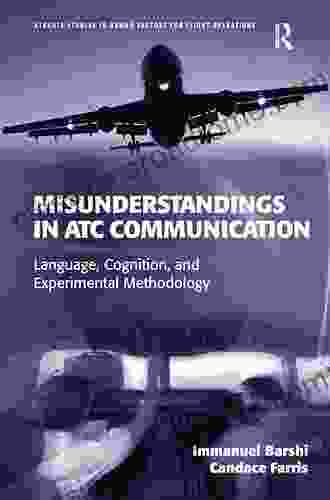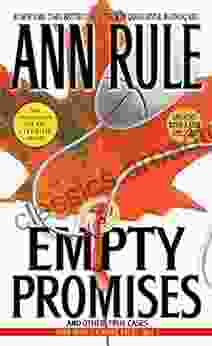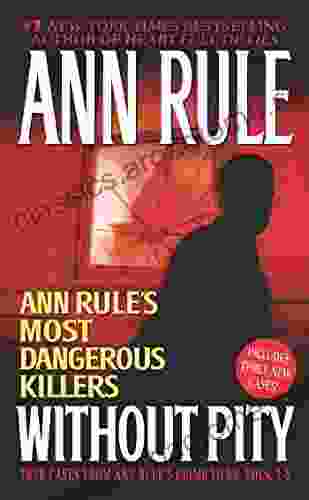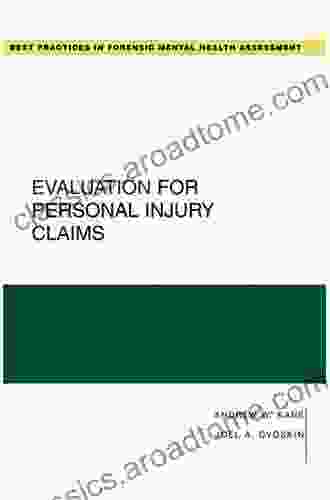Evaluation for Personal Injury Claims: Best Practices for Forensic Mental Health

Personal injury claims often involve significant mental health damages. These damages can have a profound impact on the victim's quality of life and ability to function. As a result, it is essential to have a thorough understanding of how to evaluate and assess mental health damages in personal injury claims.
This guide provides a comprehensive overview of best practices for forensic mental health evaluations in personal injury claims. It covers a wide range of topics, including:
5 out of 5
| Language | : | English |
| File size | : | 3691 KB |
| Screen Reader | : | Supported |
| Print length | : | 272 pages |
| Lending | : | Enabled |
- Ethical considerations
- Interviewing techniques
- Psychological testing
- Report writing
This guide is written by leading experts in the field of forensic mental health. They have decades of experience in conducting forensic mental health evaluations and have published extensively on the topic. Their insights and guidance will help you to conduct accurate and reliable forensic mental health evaluations that will withstand scrutiny in court.
Ethical Considerations
Forensic mental health evaluations are conducted in the context of legal proceedings. As such, they are subject to a number of ethical considerations. These considerations include:
- Confidentiality: The information that you obtain during a forensic mental health evaluation is confidential. You must take steps to protect the privacy of the person being evaluated.
- Objectivity: You must be objective in your evaluation. You cannot allow your personal biases or opinions to influence your findings.
- Competence: You must be competent to conduct a forensic mental health evaluation. This means that you have the necessary training and experience to conduct a valid and reliable evaluation.
If you have any questions about the ethical considerations that apply to forensic mental health evaluations, you should consult with an attorney.
Interviewing Techniques
The interview is a key component of a forensic mental health evaluation. It is an opportunity for you to gather information about the person's mental health history, symptoms, and functioning. There are a number of different interviewing techniques that you can use. The best technique will depend on the individual case.
Some common interviewing techniques include:
- Structured interviews: Structured interviews are highly standardized. They follow a specific set of questions and procedures. This type of interview is often used when you need to gather specific information about a person's mental health history or symptoms.
- Semi-structured interviews: Semi-structured interviews are less standardized than structured interviews. They allow for more flexibility and can be tailored to the individual case. This type of interview is often used when you need to gather a more comprehensive understanding of a person's mental health.
- Unstructured interviews: Unstructured interviews are the most flexible type of interview. They allow you to ask any questions that you want. This type of interview is often used when you need to explore a particular topic in depth.
No matter which interviewing technique you use, it is important to be respectful and sensitive to the person being evaluated. You should also be aware of your own biases and how they might influence your interviewing.
Psychological Testing
Psychological testing can be a valuable tool in a forensic mental health evaluation. It can help you to objectively assess a person's mental health functioning. There are a wide variety of psychological tests that you can use. The best test or tests will depend on the individual case.
Some common psychological tests include:
- Intelligence tests: Intelligence tests measure a person's cognitive abilities. They can be used to assess a person's overall intellectual functioning or to identify specific cognitive strengths and weaknesses.
- Personality tests: Personality tests measure a person's personality traits. They can be used to assess a person's overall personality style or to identify specific personality disFree Downloads.
- Symptom checklists: Symptom checklists are used to assess a person's symptoms of mental illness. They can be used to identify specific symptoms or to track the severity of a person's symptoms over time.
- Neuropsychological tests: Neuropsychological tests measure a person's cognitive functioning. They can be used to assess a person's memory, attention, concentration, and other cognitive abilities.
It is important to note that psychological testing is not a substitute for a clinical interview. The interview is essential for gathering information about a
5 out of 5
| Language | : | English |
| File size | : | 3691 KB |
| Screen Reader | : | Supported |
| Print length | : | 272 pages |
| Lending | : | Enabled |
Do you want to contribute by writing guest posts on this blog?
Please contact us and send us a resume of previous articles that you have written.
 Book
Book Novel
Novel Page
Page Chapter
Chapter Text
Text Story
Story Genre
Genre Reader
Reader Library
Library Paperback
Paperback E-book
E-book Magazine
Magazine Newspaper
Newspaper Paragraph
Paragraph Sentence
Sentence Bookmark
Bookmark Shelf
Shelf Glossary
Glossary Bibliography
Bibliography Foreword
Foreword Preface
Preface Synopsis
Synopsis Annotation
Annotation Footnote
Footnote Manuscript
Manuscript Scroll
Scroll Codex
Codex Tome
Tome Bestseller
Bestseller Classics
Classics Library card
Library card Narrative
Narrative Biography
Biography Autobiography
Autobiography Memoir
Memoir Reference
Reference Encyclopedia
Encyclopedia Jennifer Robinson
Jennifer Robinson Lisa M Hermsen
Lisa M Hermsen Angelina Black
Angelina Black James Rouche
James Rouche Peter T Scardino
Peter T Scardino Amit Batla
Amit Batla Andy Mcquitty
Andy Mcquitty Anette Krischer
Anette Krischer Andy Mccrea
Andy Mccrea Andrew Ridgeley
Andrew Ridgeley Amelia Hutchins
Amelia Hutchins Paul G Roberts
Paul G Roberts Cynthia O Neal
Cynthia O Neal Andrew W Artenstein
Andrew W Artenstein Amber Logue
Amber Logue Jan F Kreider
Jan F Kreider Amit Phaltankar
Amit Phaltankar Julia Bourland
Julia Bourland Chase Dalton
Chase Dalton Andrew Quintman
Andrew Quintman
Light bulbAdvertise smarter! Our strategic ad space ensures maximum exposure. Reserve your spot today!

 Mikhail BulgakovElevate Your Networking Expertise: Dive into the Treasure Trove of Computer...
Mikhail BulgakovElevate Your Networking Expertise: Dive into the Treasure Trove of Computer... Truman CapoteFollow ·12.6k
Truman CapoteFollow ·12.6k Jace MitchellFollow ·15.5k
Jace MitchellFollow ·15.5k Miguel de CervantesFollow ·11.8k
Miguel de CervantesFollow ·11.8k Caleb LongFollow ·4k
Caleb LongFollow ·4k Tom HayesFollow ·8.8k
Tom HayesFollow ·8.8k Hamilton BellFollow ·16.1k
Hamilton BellFollow ·16.1k Greg FosterFollow ·10.8k
Greg FosterFollow ·10.8k Tennessee WilliamsFollow ·15k
Tennessee WilliamsFollow ·15k

 Braden Ward
Braden WardThe True Story of Murder and Betrayal
In a small town where...

 W. Somerset Maugham
W. Somerset MaughamUnraveling the Complexities of Human Language: A...
Language is a fundamental aspect of human...

 Ibrahim Blair
Ibrahim BlairTrue Crime Tales That Will Keep You on the Edge of Your...
Prepare to be...

 Rick Nelson
Rick NelsonPatterns In Rhyme: A Journey of Discovery with Patrick...
Welcome to the...

 Edgar Hayes
Edgar HayesWithout Pity: Unmasking the Evil Within
In the realm of true...

 Cooper Bell
Cooper BellFannie Lou Hamer's Indelible Legacy: Unraveling the...
The Black Freedom Movement, a pivotal...
5 out of 5
| Language | : | English |
| File size | : | 3691 KB |
| Screen Reader | : | Supported |
| Print length | : | 272 pages |
| Lending | : | Enabled |










